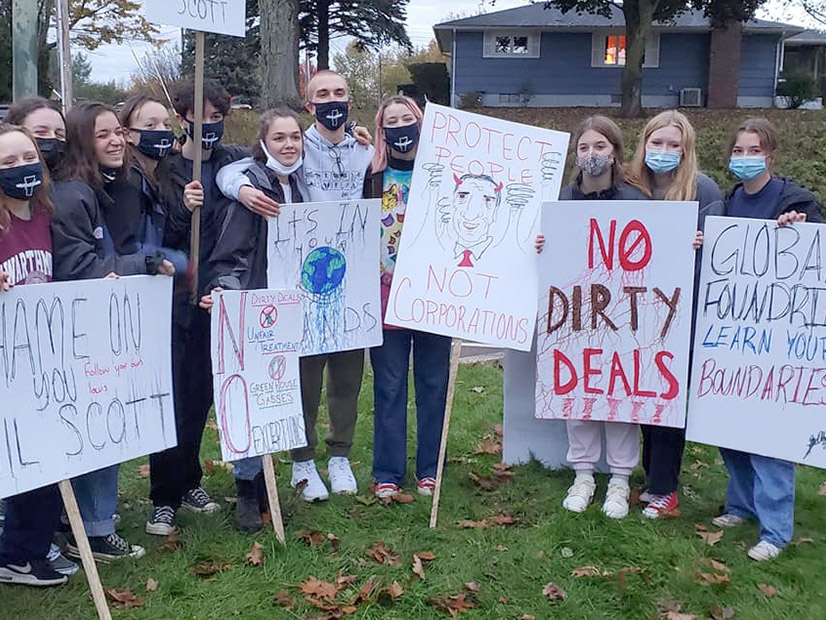
Parties to semiconductor manufacturer GlobalFoundries’ case seeking utility status in Vermont have been unable to reach an understanding on what the company’s emissions-related responsibilities should be.
Regulators granted an extension in the case in October to give the Vermont Department of Public Service (DPS), Vermont Agency of Natural Resources (ANR) and GlobalFoundries more time to reach an agreement on a greenhouse gas reduction plan. But the company said in filing on Friday that while the parties have “engaged in productive discussions,” they have not reached an agreement and discussions will continue.
GlobalFoundries filed a petition in March asking the Vermont Public Utility Commission to grant it “self-managed utility” (SMU) status (21-1107-PET) and allow it to purchase electricity in the ISO-NE market instead of from Green Mountain Power.
At issue in the case is whether as an SMU, GlobalFoundries would be subject to Vermont’s renewable energy standard, a cornerstone of the state’s plan to reduce emissions under the 2020 Global Warming Solutions Act. GlobalFoundries has a facility in Essex and is responsible for 8% of the state’s electricity load. In its petition, the company said it should be exempt from RES compliance because it does not intend to distribute electricity.
Environmental advocates are adamant that the company’s sizeable load requires that it be held accountable to Vermont’s clean energy and pollution reduction requirements. The GWSA stood up the state’s first climate council, which is currently compiling a climate action plan for adoption Dec. 1. As part of the plan, the council is considering increasing the state’s RES from 75% by 2032 to 100% in a year to be determined.
The Vermont Public Interest Research Group filed a petition on Nov. 8 that 760 residents signed asking the state to reject GlobalFoundries’ request to be exempt from the law.
“If Vermont accedes to GlobalFoundries wishes, it would be putting energy policy authority for 8% of Vermont’s electricity usage — more than the amount used by the city of Burlington — in the hands of a multibillion-dollar, multinational corporation,” Ben Edgerly Walsh, VPIRG climate and energy program director, said in a letter accompanying the petition.
GlobalFoundries, DPS and ANR agreed to a tentative GHG reduction plan in September, with the potential to reach a definitive memorandum of understanding by the end of October. That plan includes efficiency and GHG reduction obligations for GlobalFoundries that would start in January and a 26% reduction target for 2025 in line with the GWSA. The plan does not define any way to comply with the state’s RES.
In granting an extension in the case, regulators asked parties to submit an MOU by Monday, but that did not happen. Should the parties agree on a final GHG framework, GlobalFoundries said, “they may ask the commission’s leave to submit a proposal at a later date.”
Motion to Dismiss
GlobalFoundries’ request for SMU status is unprecedented and has no basis in state law, and regulators have requested comments on whether the PUC has jurisdiction to grant it.
Vermont-based solar tracker manufacturer AllEarth Renewables filed a motion on Nov. 8 asking the PUC to dismiss the case for lack of jurisdiction. GlobalFoundries meanwhile determined that the PUC does have jurisdiction after looking “long and carefully” at the question, according to a Nov. 8 company brief.
The SMU concept is appropriate for public and legislative debate, AllEarth said, but it is “well beyond” commission authority.
“Vermont electric utility franchising and regulation has long been built upon a structure of vertically integrated electric utilities subject to comprehensive rate regulation … and the legislature has not enacted laws that confer the ‘retail electricity choice’ that comprises a large part of what GlobalFoundries seeks,” AllEarth said.
But GlobalFoundries said that a finding that the PUC does not have jurisdiction would prevent it from protecting Vermonters from the negative consequences of such a large user exiting the state’s retail electricity market.
The company claimed that it would be allowed to pursue an alternative to regulated service “without any oversight to ensure that the proposed plan, as a whole, will promote the general good of the state and be consistent with the state’s energy policy goals.”
That scenario, the company said, “would be a unique omission in the fabric of the commission’s jurisdiction.”


